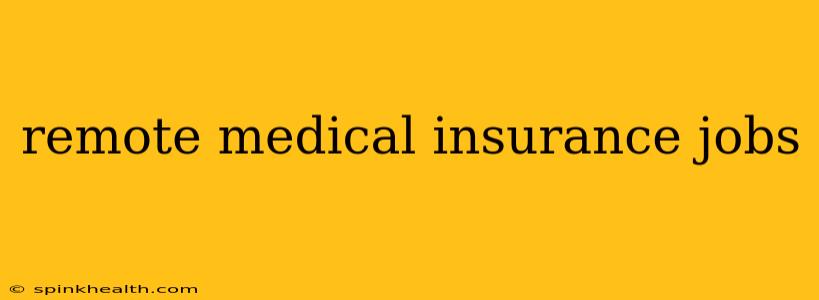Remote Medical Insurance Jobs: Your Guide to a Rewarding Career From Home
The world of work has changed dramatically, and the healthcare industry is no exception. More and more professionals are discovering the flexibility and freedom of remote medical insurance jobs. But what exactly are these jobs, and how can you find one that's the right fit for you? Let's delve into this exciting and growing field.
Imagine this: You wake up, grab a coffee, and start your workday from the comfort of your home office. No more stressful commutes, no more office politics, just you and your work, contributing to the well-being of others. That's the reality for many who have successfully transitioned to remote medical insurance roles.
What are the different types of remote medical insurance jobs?
The beauty of remote work in medical insurance lies in its diversity. There isn't one single "remote medical insurance job." Instead, there's a whole spectrum of possibilities, catering to various skillsets and experience levels. Let's explore some common roles:
-
Medical Insurance Sales Representatives: These professionals work remotely, contacting potential clients via phone, email, or video conferencing to explain insurance plans, answer questions, and help them choose the right coverage. The ability to build rapport and effectively communicate complex information is key.
-
Medical Insurance Claims Processors: These roles often involve reviewing and processing medical insurance claims, verifying information, and ensuring accurate payments to providers. Strong attention to detail and familiarity with medical coding and billing practices are crucial.
-
Medical Insurance Customer Service Representatives: These individuals act as the primary point of contact for policyholders, answering questions about coverage, claims, and other insurance-related matters. Exceptional customer service skills and the ability to handle stressful situations calmly are essential.
-
Medical Underwriters: While some underwriting roles require in-person interaction, many can be done remotely. Underwriters assess the risk associated with insuring individuals or groups, determining eligibility and setting premiums. A strong understanding of medical terminology and risk assessment is vital.
What skills are needed for remote medical insurance jobs?
Beyond specific job requirements, several transferable skills are highly valued across various remote medical insurance positions:
-
Excellent communication skills: Whether it's written or verbal communication, the ability to clearly and effectively communicate with clients, colleagues, and providers is paramount.
-
Strong computer skills: Proficiency in various software applications, including CRM systems, claims processing software, and Microsoft Office Suite, is crucial.
-
Problem-solving skills: The ability to quickly and efficiently solve problems, especially those related to claims or policy discrepancies, is highly desirable.
-
Attention to detail: Accuracy is crucial in medical insurance, and attention to detail is essential for ensuring accurate claim processing and policy administration.
-
Time management skills: Working remotely requires strong self-discipline and the ability to manage your time effectively to meet deadlines and stay organized.
How can I find remote medical insurance jobs?
The search for your ideal remote medical insurance job starts with targeted online searches. Utilize job boards like Indeed, LinkedIn, and Monster, specifying "remote" and "medical insurance" in your search criteria. Company websites are another excellent resource; many insurance companies actively promote remote job openings directly on their career pages. Networking through professional organizations and attending virtual career fairs can also open doors to hidden opportunities.
What are the advantages and disadvantages of remote medical insurance jobs?
Advantages:
- Flexibility: Set your own hours (within reason, of course).
- Work-life balance: More time for family, hobbies, and personal pursuits.
- Cost savings: No commuting costs, potential for lower childcare expenses.
- Comfort and convenience: Work from the comfort of your home.
Disadvantages:
- Isolation: Lack of face-to-face interaction with colleagues.
- Requires self-discipline: Staying motivated and focused while working from home can be challenging.
- Technology dependence: Reliable internet access and equipment are essential.
- Potential for distractions: Working from home can present distractions that need to be managed effectively.
What is the salary range for remote medical insurance jobs?
Salary expectations vary greatly depending on the specific role, experience, location, and company. However, many remote medical insurance jobs offer competitive salaries and benefits packages comparable to their on-site counterparts. Researching salary ranges for specific positions on sites like Glassdoor or Salary.com can provide valuable insights.
What certifications or licenses are required for remote medical insurance jobs?
The specific certifications or licenses required will vary depending on the specific role and state regulations. However, some common certifications include the Certified Insurance Service Representative (CISR) and the Associate in Claims (AIC). It's always best to check the job description for specific requirements.
Embarking on a career in remote medical insurance can be a fulfilling and rewarding experience. With the right skills, dedication, and a strategic job search, you can find the perfect remote position that aligns with your career aspirations and lifestyle preferences. Remember to research thoroughly and prepare yourself for the demands of remote work. Good luck on your journey!

